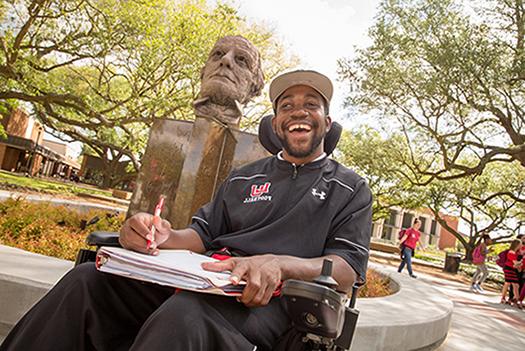Disability Documentation Guidelines
 To determine eligibility for disability-related accommodations, students shall provide documentation of a disability as defined by applicable laws (Section 504 of the Rehabilitation Act of 1973, the Americans with Disabilities Act of 1990 and the ADA Amendments Act of 2008). A disability as a physical or mental impairment that substantially limits one or more major life activities. Federal Law requires that requests for services for students with disabilities be considered on an individual, case-by-case basis.
To determine eligibility for disability-related accommodations, students shall provide documentation of a disability as defined by applicable laws (Section 504 of the Rehabilitation Act of 1973, the Americans with Disabilities Act of 1990 and the ADA Amendments Act of 2008). A disability as a physical or mental impairment that substantially limits one or more major life activities. Federal Law requires that requests for services for students with disabilities be considered on an individual, case-by-case basis.
Disability-related documentation must by a licensed or credentialed professional who is authorized to provide the diagnosis. They must have relevant training and experience with no personal relationship to the student.
Documentation Guidelines
- Typed on letterhead, dated and signed by a qualified professional.
- Identify a diagnosis and any related findings or diagnostic tests that support the diagnosis.
- Describe any functional limitations in the academic setting and/or living environment, as applicable.
- Identify the severity, prognosis and/or expected progression of the condition, as applicable.
Other Considerations
- Documentation should be recent enough to reflect the student's current condition, typically within the past 3-5 years.
- For Learning Disabilities diagnosed in the K-12 setting, an IEP or 504 Plan that clearly identifies a Learning Disability will be considered.
- Diagnosis submitted from the student's patient portal (or other electronic health record) that includes key identifying features including the name and contact information of a qualified healthcare professional will be considered.
While not required, the qualified professional may provide recommendations for disability-related accommodations. These should logically relate to the functional limitations of the condition. The ARC has no obligation to provide nor adopt recommendations made by outside entities. Recommendations are given consideration during the interactive process with the student at the intake meeting.
Sources of information used for determining a disability and/or academic adjustments and/or accommodations may include also include student’s self-report and direct observation and interaction with the student. The ARC reserves the right to request additional or updated documentation, as necessary, to evaluate requests for accommodations. Updated documentation may also be requested for disabilities that are dynamic in nature. The ARC does not fund nor provide evaluations or testing from qualified professionals.
Temporary impairments, such as injuries, may not qualify for protection under the Americans with Disabilities Act (ADA). Students seeking accommodations for a temporary impairment are encouraged to follow the registration and intake process for evaluation of eligibility for temporary accommodations.
Documentation may be uploaded into the AIM system with your application, e-mailed to the Accessibility Resource Center at arc@viableenergynow.com, or delivered in-person to the ARC office located in Suite 105 of the Communications Building.